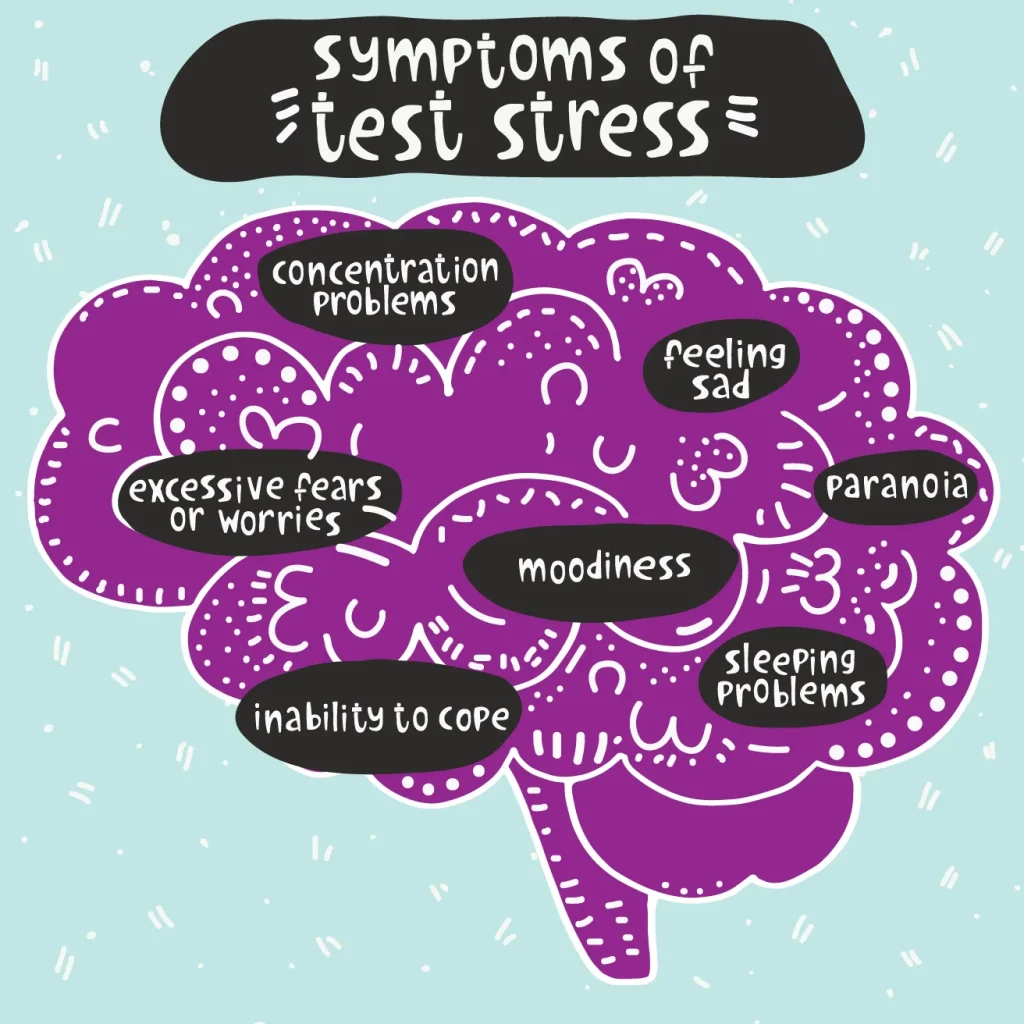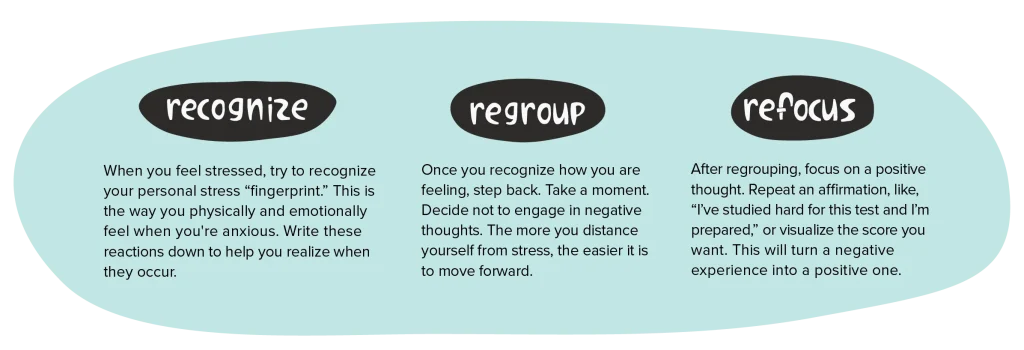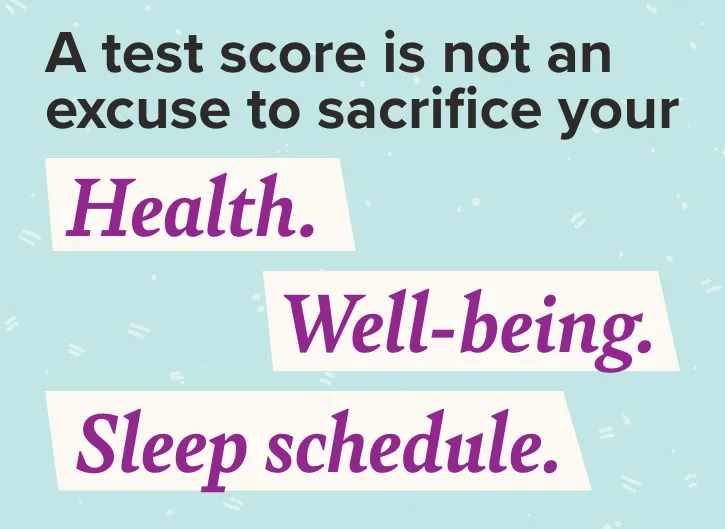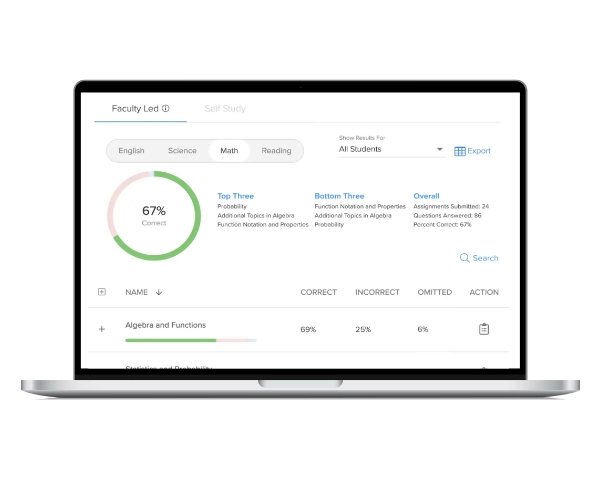According to many high school teachers with firsthand exam experience, which of the following is most likely to happen during the formal assessment season this year?
- At least one student will emotionally break down and/or get physically ill as a direct result of the pressure to score well on a test.
- At least one teacher will leave a data meeting in tears after an administrator demands to know why their student (who is regularly absent and doesn't turn in assignments) has failed the last benchmark exam.
- Last year, an anxious honors student did not sleep well the night before a formal assessment and ended up earning a low test score. Because of this, they will now be required to stay in school for an additional 10–20 hours each week to make time for mandated tutoring sessions.
- At least one teacher on your campus will go to the emergency room after an especially strong panic attack brought on by trying to keep up with the required test review schedule.
- All of the above.
The answer to this multiple-choice question may be "E," but the solution to it is something else entirely—that is, we need to find ways to address student (and teacher) test anxiety.
Test-Taking Anxiety: Recognizing the Problem
In short, test anxiety is that gnawing feeling of unease that students get when facing high-stakes academic evaluations. Due to the current focus on standardized tests and academic performance, test stress is spreading like wildfire all throughout the world.
What causes exam anxiety?
At high schools everywhere, test anxiety is an increasing problem that affects both students and teachers. High-stakes assessments can put a lot of pressure on students, which can have a negative effect on their academic achievement, emotional health, and general quality of life. Because of the pressure on exams, some students even develop long-term mental health problems like depression and anxiety disorders.
Teachers also get nervous before formal exams because they are often put under a lot of pressure to get high test scores. Educators are held accountable for student academic performance and face criticism if their students do not hit their scoring targets on exams. This pressure can greatly affect their mental and emotional well-being. Many of the things that cause test stress in both students and teachers are out of their control, but addressing test-taking anxiety as much as possible in the classroom is crucial. By recognizing this issue, educators can take the steps necessary to manage their stress levels and improve their overall well-being.
Symptoms of test anxiety

Students’ test anxiety can show up in many physical ways, including sweating, trembling, or a faster heartbeat. Together with cognitive symptoms like difficulties focusing, negative self-talk, or racing thoughts, exam anxiety in students can cause a lot of discomfort. The emotional symptoms of fear, dread, and panic are also common. Students may find these symptoms particularly difficult because they struggle to concentrate and do their best on assessments.
Test anxiety can cause teachers to have similar physical symptoms, too, like headaches, nausea, or trouble sleeping. Teachers also experience cognitive problems from exam stress, like hyperfocusing on lesson plans, test scores, and grades. They might even have emotional symptoms, like feeling helpless or burned out.
It’s crucial to deal with test anxiety not only to improve academic performance but, most importantly, to improve mental health. Creating a safe and healthy environment for both students and teachers is vital to the well-being of a school.
Strategies to Help Students Alleviate Test Pressure
When it comes to test pressure, teachers play a critical role in helping their students cope. Whether building their confidence with a proper test review or teaching them techniques to stop anxiety in its tracks, anything a teacher can do to support their students with this is a win.
Test Anxiety Coping Skills: The Three Rs
Dr. Janani Krishnaswami, part of the UWorld Medical team and a Lifestyle Medicine Specialist in North Texas, suggests the three Rs. These three coping skills—recognize, regroup, and refocus—are a good way for teachers to help their students deal with exam stress.

- The first step in the process is to help students recognize the physical and emotional symptoms of test-taking anxiety. Teachers can educate their students on how to identify and write down their stress fingerprint, empowering them to take a proactive approach in managing their stress levels.
- Once students have recognized their stress fingerprint, the next step is to regroup. Teachers can encourage their students to distance themselves from negative thoughts and worst-case scenarios by taking deep breaths, practicing relaxation techniques, and engaging in other stress-reducing activities.
- Finally, it’s essential to re-focus on positive thoughts and move forward. Students can repeat positive affirmations or visualize the score they want to achieve on the exam they’re preparing for. By channeling their nervous energy into something positive, they can turn a negative experience into a beneficial one.
Teachers can help their students deal with test anxiety and learn healthy ways to handle stress by teaching them the three Rs of coping skills. By creating a supportive learning environment that promotes student success, teachers can help their students succeed both in and out of the classroom.
Preparation: Test-Taking Strategies and Reviews
As a teacher, one of the simplest ways to keep your students from getting nervous about exams is to make sure they are well prepared for them. Students will feel more confident on test day if they have time to spiral through hard concepts with retrieval practice and detailed explanations. Using reliable test-taking strategies, thorough test reviews, and rigorous online learning tools like UWorld’s Learning Tools for AP® Courses are excellent ways to prepare students, as well.
All in all, students who feel well prepared for exams are more likely to show up with confidence on test days and perform well on them.
Balance: All Work and No Play Make Anxious Students
Finding a balance between rigorous content review and engaging learning activities is a great way to keep student test anxiety low. By finding a good balance between work and play, teachers can create a positive classroom environment that helps students make real connections to what they are learning and reduce stress. Offering brain breaks, guided meditations, or taking students outside for a change of scenery can help students recharge and refocus their attention, improving their overall performance.
A University of Oxford study that was published in the journal “Learning and Instruction” also found that fun educational activities, such as games and creative assignments, can improve students' social and cognitive skills as well as their motivation and engagement in the classroom. The study also found that careful review and practice are important if you want to remember information over the long term.

Students also need to relax after spending hours in a quiet room taking tests. Teachers can take them outside for a walk, allow them to listen to music, play quiet games with them, or give them time to talk about their experience. Allowing students to draw, read, or quietly talk to their friends are additional ways students can release any pent-up energy.
Reality Check: A Shift in Perspective
As a teacher, you have the power to ease your students' test-taking anxiety by helping them shift their perspective. One key strategy is to remind them that test scores won't ruin their whole academic journey. Another belief teachers can address with their students is that exams are not a competition or a reason to compare themselves with their peers. Someone else’s higher test score does not result in their own personal failure.
J.B. Hinrichs, a DFW marketing executive, spoke about his own daughter's experience with crippling test anxiety and why he believes it is so common among teens.
There’s a lot of natural competition among students, which is what creates that pressure. There’s peer pressure to do well, so they lose sleep over [test outcomes].
Test scores can help a student get into a school or a program of choice, but they don’t determine whether or not a student will succeed in college. A high school student's AP, SAT®, or ACT® scores aren't a sign of how well they'll do in their future career, either. Even if a new graduate strives to land a highly sought-after job in Silicon Valley, their future employer won't be interested in their high school test scores. As someone who hires a lot of people, Mr. Hinrichs was able to comment on this as well.
As a boss, I'm not looking at your high school grades or test scores. These are helpful for college and financial aid applications, but a high school test won't ruin the rest of your life. Is that an excuse to do poorly? Absolutely not, but a test score is not an excuse to sacrifice your health, well-being, or sleep schedule either, just so you don't get an A-minus instead of an A.
According to the College Board®, "AP scores are not a measure of a student's worth or potential, and they should not be interpreted as such." You can help students do better on tests by getting them to see them as a way to learn about their strengths and areas where they need to improve rather than as a predictor of how well they will do in the future.

Exam Anxiety and the Pressure on Teachers for High Test Scores
Students are not the only ones who feel anxious about test scores, either. Teachers are put under a lot of pressure to prioritize standardized tests and their outcomes. This stress often affects their personal lives and families. The "No Child Left Behind Act" has only resulted in tests becoming more important, which makes it harder for both teachers and students. In some cases, the results of these tests can impact a teacher's salary or affect whether they'll be offered a job contract for the next school year. This can make teachers feel helpless and out of control. Even if a teacher gives a student every chance to succeed, all the information they need, and an abundance of test-taking strategies, it's still up to the student to use what they've learned.
The impact of standardized testing on educators can be overwhelming. After all, test scores can be affected by things that teachers can't control, like student anxiety, sleep, hunger, and their own desire (or lack thereof) to do their best. This can make teachers feel like their career success depends on the responsibility of teenagers and can add to the stress they already feel. And at the end of the day, even though testing is important, it shouldn't come at the expense of a teacher's health.
Realistic Ways Teachers Can Cope with the Pressure
Telling teachers to deal with the pressure of test outcomes by making time for self-care bubble baths or remembering to take breaks throughout the day is an overly simplistic (and unrealistic) solution to a complex problem. Such ideas can come off as dismissive, condescending, and unrealistic. Addressing anxiety requires a whole-person approach that looks at the causes and offers realistic solutions.
Prepare a Panic Plan
Get Help
Safety in Numbers
Remember Your Worth
Prepare a Panic Plan
Get Help
Safety in Numbers
Remember Your Worth
Keep an emergency critical concept plug-and-play lesson in a subfolder, just in case the stress becomes overwhelming, and you need to use PTO for a mental health day. And before you start to argue that you’d never be able to take a day off of school like that, remember that you are no good to anybody in the classroom if you are a miserable mess in the corner. Furthermore, you have a responsibility to show your students what it means to set healthy boundaries around your health and to demonstrate that it’s okay to prioritize your mental well-being.
Just a Band-Aid on the Problem: The Need for a Systematic Shift
Test anxiety coping strategies are great, but they're not enough to fix the overall issue. To say that simply teaching your students the three Rs of coping with exam stress or remembering your worth as a teacher are solutions to all-encompassing feelings of test pressure is a joke. Over the past few decades, standardized tests and arbitrary learning standards have become more and more important. K–12 education needs a shift in values, not a bandaid on a broken system. The data surrounding this issue is truly staggering.
- According to the National Education Association (NEA) studies and surveys:
- 78% of teachers reported experiencing stress or anxiety due to standardized testing
- 70% of educators say that state assessments are not developmentally appropriate for their students.
- Over 90% of teachers believe that high-stakes testing has a negative impact on teaching and learning.
- A study by the American Psychological Association found that high-stakes testing can cause anxiety and stress in students, which can negatively impact their performance.
- According to the source, "Effects of Standardized Testing on Educators," combined with the high pressure and stakes attached to standardized tests, teachers often feel compelled to teach to the test, with 55% of educators reporting that test preparation takes up too much time in their classrooms.
- Research conducted by the Center for American Progress found that arbitrary learning standards can lead to "teaching to the test," which can increase stress and anxiety in students.
- According to a survey conducted by the Learning Policy Institute, many teachers reported that the pressure to catch up on pandemic learning loss has caused stress and anxiety among students.
The Solution: Get Rid of Test Stress, Not Tests
It's true—both students and teachers can struggle with test anxiety. Even so, exams are still important ways to find out how students are doing and make sure they are learning the same things. Without testing, detecting learning gaps and offering focused support to kids becomes difficult. Aside from the problems that come with test anxiety, it is important to understand how essential tests can be in education.
Rather than abandoning testing entirely, the answer may lie in changing how we approach it. An article from American Progress says that the future of testing will focus on two main ways to make exams less stressful: reducing the number of high-stakes tests and incorporating more formative assessments into the classroom. It has been shown that high-stakes tests make students more nervous and less interested in learning, which leads to lower test scores and worse academic performance. To deal with this, states and school districts are looking for alternatives to traditional high-stakes tests, such as project-based assessments, performance tasks, and portfolios. Students can show off their knowledge and skills in a more real and interesting way with these kinds of tests, which reduces stress and boosts motivation.
Overall, the future of testing to reduce test anxiety is focused on creating a more balanced and whole-person assessment method that supports student learning and growth instead of just measuring their knowledge at a single point in time. By giving fewer high-stakes tests and more formative assessments in the classroom, schools can make learning more supportive and interesting for all students.
At UWorld, we value authentic student understanding. Our Learning Tools aren’t a collection of stressful “drill and kill” exercises, but instead help students learn the difficult concepts they need with thorough answer explanations so they can take their AP, SAT, and ACT tests with confidence.





